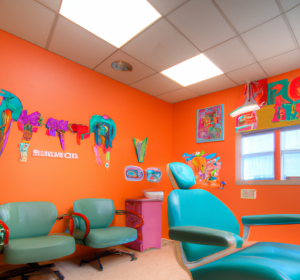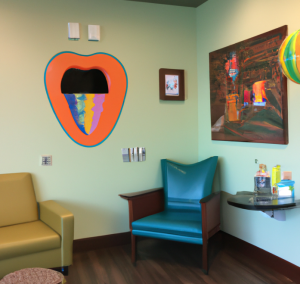Children’s Fear Of Separation From Parents When Visiting The Dentist: How to Prepare Your Child for Their Visit
Sometimes it’s just as scary for the parent as it is for the child to go to the doctor. The equipment’s strange noises and the strange people in white coats can be too much for little ones to handle. As a parent who has been through this many times, I know that the best way to make sure a child has a good dental visit is to prepare them well and see things from their point of view.
This means realizing their fears, talking to them gently about them, and making the meeting seem like a good thing. Here, I talk about the ideas and methods that have made my child’s dental visits less stressful and more like a chance to learn and feel strong.

How to Understand Your Child’s Anxiety
Kids often get scared when they are in new or strange situations, and going to the doctor is no different. This kind of worry can come from a natural fear of being away from parents or other adults who care for them. This anxiety often stems from the fear that something bad or unexpected will happen when they are not in their safety zone or with their main providers.
When we feel anxious, our bodies release adrenaline, a hormone that gets us ready to fight or run when we think we are in danger. This increase in adrenaline directly causes a child’s fast heartbeat or stomach butterflies. This is normal, but it can be too much for them to handle without the right support and reassurance.
Seeing my kids’ early signs of worry before they went to the dentist helped me deal with them in a healthy way. Some signs include neediness, temper fits, or problems with things they used to be able to do on their own, such as going to the bathroom. Watching them act this way made me look for ways to calm their fears.
Making the anxious feelings seem normal was one thing that worked. I told my kids stories about times when I was worried and how I handled them, making sure to link them to things that were interesting to them due to their age. This method of communication often helped them feel understood and less scared of the unknown.
It also helped to talk about what to expect from the doctor to directly address the fear. By telling us who we would see, what the rooms looked like, and even what sounds they might hear, they took the mystery out of the experience and made us feel at ease before the visit.
Techniques for Talking Before the Meeting
If you talk to your child about their future dentist visit in a good way, the experience will go more smoothly. When I first started taking my kids to the doctor, I made sure we had an open conversation that was geared toward their level of knowledge.
Before talking about the doctor, pick a time when you are calm and at ease. Try not to talk to your child when they are already tired or worried. I found that talking about our trips to the dentist over a casual dinner or after reading a favorite book kept the conversation light and happy.
You should use easy language to explain the reason for the visit. “The dentist is going to check your smile and count your teeth to make sure they’re all happy!” is one way to make the visit seem like a good thing that needs to be done, not something scary.
Getting people to ask questions and clear up any misunderstandings can also help reduce nervousness. Kids often worry about things they don’t know much about or have the wrong ideas about. When my son asked if it would hurt, I told him that the dentist has special tools to make sure kids are as comfortable as possible, and they know how to make kids feel safe and secure.
You might also find it helpful to act out the visit. We played “dentist” at home. I was the dentist, and my child was the patient. To carry out the check-up, we used things like a toothbrush. For them, this made it fun and helped them understand what to expect.
Instead of focusing on the fact that they need to see the dentist because they have a hole, pointing out how healthy teeth allow them to eat their favorite foods can make the visit seem useful in its own right.

Getting Your Kid Ready for a Visit
It was hard for me to make sure my child didn’t feel stressed when we first started taking them to the doctor. It worked for us to start getting ready for the visit days before it happened. We would talk about what would happen during the visit in a happy and relaxed way, focusing on the order of events rather than the specifics that could make people nervous.
I thought it was helpful to involve my child in fun dental-related tasks. At home, we set up a “fake dental clinic” where we would switch roles as the patient and the doctor. My child got used to the idea of someone looking into their mouth through role-playing, which can be very upsetting for little kids.
Another strategy was to read books for children about going to the dentist. These stories aim to transform kids’ dental visits into enjoyable adventures, thereby reducing their fear. We would talk about the characters and how strong they were while sitting in the dentist’s chair, which made my child want to be like them.
I also found that picturing the visit really helped. We watched movies that were safe for kids and showed what happens at the dentist’s office. Seeing other kids smile and not be scared helped make the dental visit seem like a good thing.
Finally, we made sure to bring a favorite toy with us on the meeting day. This wasn’t just any toy; my child deliberately picked out this “dental buddy” for this particular event. Holding on to this familiar thing helped me feel safe and at ease during the visit.


How to choose the best pediatric dentist
Finding a youth dentist that is a good fit for your child can make a huge difference in how well they behave and feel during dental visits. First, I asked other parents in my area for suggestions when I started my search. Hearing first-hand reports of their experiences helped me learn a lot about how different doctors act and treat their patients.
I planned to visit dentist offices to observe their setup. A child-friendly office with brightly colored walls and a play area stood out as a place kids would want to be. I also cared about how the staff interacted with the kids. Those who were naturally kind and patient made the place feel safe and fun.
I paid close attention to how the doctor talked to my child during the first appointments. The best dentists were the ones who got down on their knees to talk to my child and showed them how their tools worked in a fun and easy-to-understand way. This method made people feel less anxious and helped build trust.
We also looked for doctors who used cutting-edge technology that was made to make people feel better. The visits went a lot more smoothly thanks to digital x-rays and panoramic images, which are faster and less invasive than older methods.



How to feel less nervous at the dentist
In my quest to make my child’s dental checkups less scary, I’ve learned a few things that make them feel a lot less anxious. One good idea is to create a “countdown calendar,” which helps build excitement in a fun way as the meeting day gets closer. It gets less scary as time goes on because we talk a little about what might happen at the doctor every day.
We’ve found that playing my child’s favorite songs helps keep them busy and calm during the trips. The music, which is familiar, is soothing in the background of the strange sounds coming from the clinic. Furthermore, I always remember to bring sunglasses for my child. They help with the bright lights over the dentist’s chair, making the outfit more fun.
Adding controlled breathing methods was another thing that changed the game. We practiced deep breathing techniques at home that my child could then use when going to the dentist. Not only does this help calm them down, but it also makes them feel like they have control over their bodies when they might otherwise feel helpless.
Finally, we came up with a simple hand gesture that my child could use to let me know they needed a break if they were feeling uncomfortable. This small tool gives them a lot of power and changes how they think about and deal with their worries.







